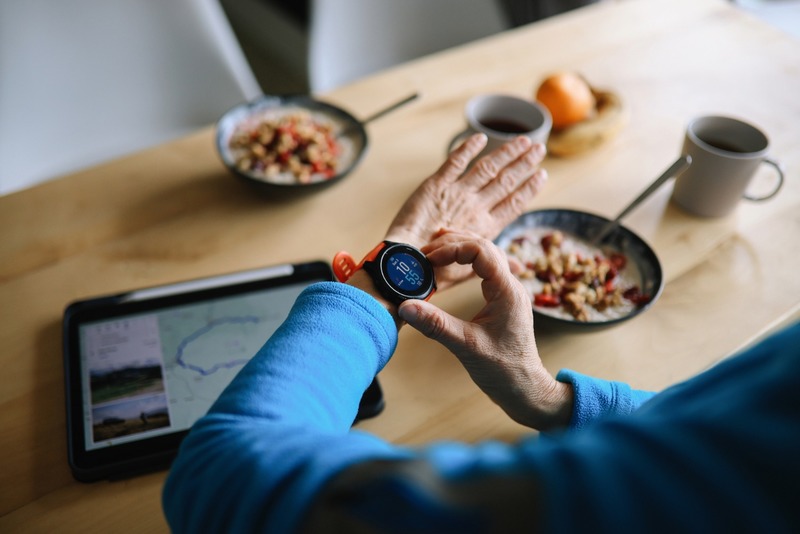News
The Breakfast Debate: Is It Really the Most Important Meal of the Day?

The age-old adage that breakfast is the most important meal of the day has been ingrained in our culture for decades. But where did this idea come from, and is it truly backed by science? Clinical Dietitian III and Certified Diabetes Care Education Specialist Katie Mazzia, MS, RDN, CDCES and Clinical Nutrition Manager III Kellie Koswick MS, RDN, CSG delve into the history, benefits and modern perspectives on breakfast to uncover the truth.
In the 1920s, Edward Bernays, a PR consultant for Beech-Nut, promoted a protein-rich breakfast of bacon and eggs as healthier than a light breakfast. This campaign significantly influenced American eating habits and 70% of bacon is now consumed at breakfast. Today, we know not to eat a daily dose of processed meats, and we’ve learned that a light breakfast might work better for some. Bernays was onto something when he emphasized the importance of protein, but it doesn’t necessarily need to be consumed in the beginning of the day.
What we now know is that the key to good health is to maintain a balanced diet of nutrient-dense food throughout the day. If you’re hungry in the morning, satisfy yourself with healthy food. If you’re not a breakfast person, make sure to get the nutrition you need later in the day.
Numerous studies have shown that breakfast eaters tend to have better overall diets. They consume more fruits, vegetables, whole grains and less fat compared to those who skip breakfast. Breakfast provides essential nutrients and energy to kickstart the day, which can be particularly beneficial for cognitive function and physical activity.
The benefits of eating breakfast include the following:
- Blood sugar regulation: Eating breakfast helps stabilize blood sugar levels, which is vital for cognitive function and overall energy.
- Increased movement: People who eat breakfast tend to be more active in the morning, contributing to better overall health.
- Heart health: Regular breakfast consumption can lead to less weight gain over time, lower cortisol levels and improved cardiometabolic health.
Is It Bad to Skip Breakfast?
While breakfast has its benefits, skipping it isn’t necessarily detrimental for everyone. It’s important to listen to your body and eat when you’re hungry versus following a diet or rules about eating. However, prolonged fasting can lead to overeating later in the day, driven by hunger hormones like ghrelin. For those who exercise in the early morning, skipping breakfast can result in poor performance and fatigue, so it’s advisable to eat a small snack before working out.What to Eat for Breakfast
The quality of your breakfast matters more than simply eating it. Focus on nutrient-rich options like fruits, whole grains, protein and healthy fats. Avoid processed foods and added sugars. Following are some quick and healthy breakfast ideas:- Overnight oats: Easy to prepare and nutritious. Mush® is a prepared grocery item in the cold section.
- Muesli: A versatile option that can be enjoyed hot or cold (ex. Bobs Red Mill®).
- Kefir yogurt drink: A quick protein boost.
- Nuts and dried (unsweetened) or fresh fruit: A simple, portable breakfast.
- Greek yogurt with berries and nuts: Balanced and delicious.
- Smoothies: Blend fresh or frozen fruit, hemp seeds, water and vegetables for a nutritious start to your day.
- Whole grain toast with nut butter, sliced apples and cinnamon: A classic, easy choice.
- Egg and avocado sourdough toast: Nutritious and filling (limit eggs yolks to 3-4 per week).
Meal Prep Ideas
For those who are pressed for time, meal prepping can be a lifesaver. Make whole grain pancakes and freeze extras, prepare homemade energy bites, or set up overnight oats for a quick grab-and-go breakfast.While breakfast can offer numerous health benefits, it’s not necessarily the most important meal of the day for everyone. The key is to maintain a balanced diet throughout the day. Whether you’re a breakfast enthusiast or prefer to skip it, focus on nutrient-dense foods and balance in your overall diet.
Try this Healthy Breakfast Recipe
Ancient Grain Pumpkin Banana PancakesFrom mindful.sodexo.com
Two fluffy whole grain pancakes packed with hearty oats and quinoa and topped with bananas, maple syrup, and toasted walnuts.
Ingredients
- 2 ½ cups water
- 1 ½ cup of store-bought buttermilk pancake mix
- 1/3 cup whole wheat flour
- 1/3 cup canned pumpkin
- 1/3 cup cooked quinoa
- 1/3 cup oats
- ½ teaspoon ground cinnamon
- ½ teaspoon ground nutmeg
- ½ teaspoon ground ginger
- 1 large banana, peeled and sliced
- 1 Tablespoon and 1 teaspoon of pure maple syrup
- 1 Tablespoon and 1 teaspoon of walnut pieces, toasted
Directions
- Pour water, pancake mix, and flour into a mixing bowl. Whisk until batter is blended and smooth. Do not overmix.
- Stir in pumpkin, cooked quinoa, oats, cinnamon, nutmeg, and ginger until well combined.
- Brush a large nonstick skillet or griddle with oil and heat over medium-low heat. Add ½ cup batter and cook for 2 ½ minutes or until bubbly on top and golden on the bottom. Flip and cook for another 2 minutes or until golden on the bottom.
- Place 2 pancakes on each serving plate. Top with:
2 oz (about ¼ cup) sliced bananas
1 teaspoon maple syrup
1 teaspoon walnuts - Enjoy immediately!
More News
-
New!
More

First Chair to Last Call: What Does Alcohol Really Mean For Your Health?
In nearly every Colorado ski town, some iteration of the neon sign blares its play-hard-party-harder anthem. It’s a not-so-subtle nod to mountain party culture, a lifestyle that normalizes combining sports and outdoor adventures with heavy drinking and partying. In Eagle County, après culture, high-altitude living and outdoor performance have coexisted for as long as locals have been sliding on snow. But how much is too much at altitude? And what role do social support systems play in helping residents find balance?
-
New!
More

Counting More Than Steps: How Wearables Can Help (or Hinder) Your Health
From step counts to sleep stages, heart rate variability to blood sugar spikes, wearable devices are giving us a front-row seat to what’s happening inside our bodies. Strapped to wrists, slipped onto fingers or wrapped around our biceps, wearables like the Oura Ring or Whoop strap promise insight and advice in the quest for better health.
-
More

Cass Barham and Sarah Crabtree Honored As Recipients of Vail Health Elevate Award
Cass Barham and Sarah Crabtree, both lab techs at Vail Health Hospital, have been named recipients of the Vail Health Elevate Award. Vail Health created the Elevate Award in June 2022 to give patients and their families an opportunity to nominate and thank employees who have touched their lives in some way.
